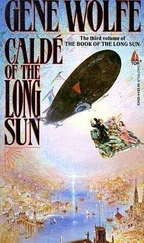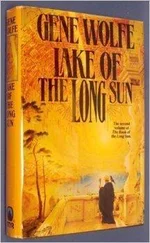Wolfe, Gene - The Best of Gene Wolfe
Здесь есть возможность читать онлайн «Wolfe, Gene - The Best of Gene Wolfe» весь текст электронной книги совершенно бесплатно (целиком полную версию без сокращений). В некоторых случаях можно слушать аудио, скачать через торрент в формате fb2 и присутствует краткое содержание. Жанр: Старинная литература, на английском языке. Описание произведения, (предисловие) а так же отзывы посетителей доступны на портале библиотеки ЛибКат.
- Название:The Best of Gene Wolfe
- Автор:
- Жанр:
- Год:неизвестен
- ISBN:нет данных
- Рейтинг книги:5 / 5. Голосов: 1
-
Избранное:Добавить в избранное
- Отзывы:
-
Ваша оценка:
- 100
- 1
- 2
- 3
- 4
- 5
The Best of Gene Wolfe: краткое содержание, описание и аннотация
Предлагаем к чтению аннотацию, описание, краткое содержание или предисловие (зависит от того, что написал сам автор книги «The Best of Gene Wolfe»). Если вы не нашли необходимую информацию о книге — напишите в комментариях, мы постараемся отыскать её.
The Best of Gene Wolfe — читать онлайн бесплатно полную книгу (весь текст) целиком
Ниже представлен текст книги, разбитый по страницам. Система сохранения места последней прочитанной страницы, позволяет с удобством читать онлайн бесплатно книгу «The Best of Gene Wolfe», без необходимости каждый раз заново искать на чём Вы остановились. Поставьте закладку, и сможете в любой момент перейти на страницу, на которой закончили чтение.
Интервал:
Закладка:
“And why are you telling me this?”
“So that you’ll understand that with the best will in the world it may not be possible for me to arrange an interview for you. At least, not this evening.”
“You could simply ask her if she knows Dr. Veil’s present address, and if so what it is.”
“I’m trying to help you, Dr. Marsch. Really I am.”
“But you don’t think that’s the best way to go about it?”
“No.”
“In other words, if your aunt were simply asked, without being given a chance to form her own judgment of me, she wouldn’t give me information even if she had it?”
“It would help if we were to talk a bit first. There are a great many things I’d like to learn about Earth.”
For an instant I thought I saw a sour smile under the black beard. He said, “Suppose I ask you first—”
He was interrupted—again—by Nerissa, I suppose because she wanted to see if we required anything further from the kitchen. I could have strangled her when Dr. Marsch halted in midsentence and said instead, “Couldn’t this girl ask your aunt if she would see me?”
I had to think quickly. I had been planning to go myself and, after a suitable wait, return and say that my aunt would receive Dr. Marsch later, which would have given me an additional opportunity to question him while he waited. But there was at least a possibility (no doubt magnified in my eyes by my eagerness to hear of new discoveries from Earth) that he would not wait—or that, when and if he did eventually see my aunt, he might mention the incident. If I sent Nerissa I would at least have him to myself while she ran her errand, and there was an excellent chance—or at least so I imagined—that my aunt would in fact have some business which she would want to conclude before seeing a stranger. I told Nerissa to go, and Dr. Marsch gave her one of his cards after writing a few words on the back.
“Now,” I said, “what was it you were about to ask me?”
“Why this house, on a planet that has been inhabited less than two hundred years, seems so absurdly old.”
“It was built a hundred and forty years ago, but you must have many on Earth that are far older.”
“I suppose so. Hundreds. But for every one of them there are ten thousand that have been up less than a year. Here, almost every building I see seems nearly as old as this one.”
“We’ve never been crowded here, and we haven’t had to tear down; that’s what Mr. Million says. And there are fewer people here now than there were fifty years ago.”
“Mr. Million?”
I told him about Mr. Million, and when I finished he said, “It sounds as if you’ve got a ten nine unbound simulator here, which should be interesting. Only a few have ever been made.”
“A ten nine simulator?”
“A billion, ten to the ninth power. The human brain has several billion synapses, of course, but it’s been found that you can simulate its action pretty well—”
It seemed to me that no time at all had passed since Nerissa had left, but she was back. She curtsied to Dr. Marsch and said, “Madame will see you.”
I blurted, “Now?”
“Yes,” Nerissa said artlessly, “Madame said right now.”
“I’ll take him then. You mind the door.”
I escorted Dr. Marsch down the dark corridors, taking a long route to have more time, but he seemed to be arranging in his mind the questions he wished to ask my aunt, as we walked past the spotted mirrors and warped little walnut tables, and he answered me in monosyllables when I tried to question him about Earth.
At my aunt’s door I rapped for him. She opened it herself, the hem of her black skirt hanging emptily over the untrodden carpet, but I do not think he noticed that. He said, “I’m really very sorry to bother you, Madame, and I only do so because your nephew thought you might be able to help me locate the author of Veil’s Hypothesis.”
My aunt said, “I am Dr. Veil; please come in,” and shut the door behind him, leaving me standing openmouthed in the corridor.
I
mentioned the incident to Phaedria the next time we met, but she was more interested in learning about my father’s house. Phaedria, if I have not used her name before now, was the girl who had sat near me while I watched David play squash. She had been introduced to me on my next visit to the park by no one less than the monster herself, who had helped her to a seat beside me and, miracle of miracles, promptly retreated to a point which, though not out of sight, was at least beyond earshot. Phaedria had thrust her broken ankle in front of her, halfway across the graveled path, and smiled a most charming smile. “You don’t object to my sitting here?” She had perfect teeth.
“I’m delighted.”
“You’re surprised too. Your eyes get big when you’re surprised; did you know that?”
“I am surprised. I’ve come here looking for you several times, but you haven’t been here.”
“We’ve come looking for you, and you haven’t been here either, but I suppose one can’t really spend a great deal of time in a park.”
“I would have,” I said, “if I’d known you were looking for me. I went here as much as I could anyway. I was afraid that she”—I jerked my head at the monster—“wouldn’t let you come back. How did you persuade her?”
“I didn’t,” Phaedria said. “Can’t you guess? Don’t you know anything?”
I confessed that I did not. I felt stupid, and I was stupid, at least in the things I said, because so much of my mind was caught up not in formulating answers to her remarks but in committing to memory the lilt of her voice, the purple of her eyes, even the faint perfume of her skin and the soft, warm touch of her breath on my cool cheek.
“So you see,” Phaedria was saying, “that’s how it is with me. When Aunt Uranie—she’s only a poor cousin of mother’s, really—got home and told him about you he found out who you are, and here I am.”
“Yes,” I said, and she laughed.
Phaedria was one of those girls raised between the hope of marriage and the thought of sale. Her father’s affairs, as she herself said, were “unsettled.” He speculated in ship cargoes, mostly from the south—textiles and drugs. He owned, most of the time, large sums which the lenders could not hope to collect unless they were willing to allow him more to recoup. He might die a pauper, but in the meantime he had raised his daughter with every detail of education and plastic surgery attended to. If when she reached marriageable age he could afford a good dowry, she would link him with some wealthy family. If he was pressed for money instead, a girl so reared would bring fifty times the price of a common street child. Our family, of course, would be ideal for either purpose.
“Tell me about your house,” she said. “Do you know what the kids call it? ‘The Cave Canem,’ or sometimes just ‘The Cave.’ The boys all think it’s a big thing to have been there and they lie about it. Most of them haven’t.”
But I wanted to talk about Dr. Marsch and the sciences of Earth, and I was nearly as anxious to find out about her own world, “the kids” she mentioned so casually, her school and family, as she was to learn about us. Also, although I was willing to detail the services my father’s girls rendered their benefactors, there were some things, such as my aunt’s floating down the stairwell, that I was adverse to discussing. But we bought egg rolls from the same old woman to eat in the chill sunlight and exchanged confidences and somehow parted not only lovers but friends, promising to meet again the next day.
At some time during the night, I believe at almost the same time that I returned—or to speak more accurately was returned , since I could scarcely walk—to my bed after a session of hours with my father, the weather changed. The musked exhalation of late spring or early summer crept through the shutters, and the fire in our little grate seemed to extinguish itself for shame almost at once. My father’s valet opened the window for me and there poured into the room that fragrance that tells of the melting of the last snows beneath the deepest and darkest evergreens on the north sides of mountains. I had arranged with Phaedria to meet at ten, and before going to my father’s library I had posted a note on the escritoire beside my bed, asking that I be awakened an hour earlier; and that night I slept with the fragrance in my nostrils and the thought—half plan, half dream—in my mind that by some means Phaedria and I would elude her aunt entirely and find a deserted lawn where blue and yellow flowers dotted the short grass.
Читать дальшеИнтервал:
Закладка:
Похожие книги на «The Best of Gene Wolfe»
Представляем Вашему вниманию похожие книги на «The Best of Gene Wolfe» списком для выбора. Мы отобрали схожую по названию и смыслу литературу в надежде предоставить читателям больше вариантов отыскать новые, интересные, ещё непрочитанные произведения.
Обсуждение, отзывы о книге «The Best of Gene Wolfe» и просто собственные мнения читателей. Оставьте ваши комментарии, напишите, что Вы думаете о произведении, его смысле или главных героях. Укажите что конкретно понравилось, а что нет, и почему Вы так считаете.









